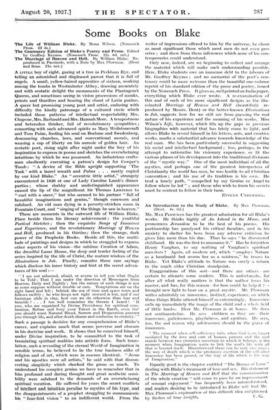An Introduction to the Study of Blake. By Max Plowman.
(Dent. 4s. Od.) MR. MAX PLOWMAN has the greatest admiration for all Blake's works. He thinks highly of An Island in the Moon, and pronounces Jerusalem to be the best of his poems. His
partisanship has paralysed his critical faculties, and in his anxiety to shelter his hero from any adverse criticism be
gives him more than his due. Thus he says " he discovered childhood. He was the first to announce it." Has he forgotten Henry Vaughan, to say nothing of 'Vaughan's spiritual ancestors ? Again, all modern art, which " employs Nature as a handmaid but scorns her as a mistress," he traces to Blake. Yet Blake's attitude to Nature was surely a return to the much older Christian standpoint.
Exaggerations of this sort—and there are others—are certain to alienate some readers. This is unfortunate, for after all what really matters is that the author loves his master, and has, for this reason—for how could he help it ?- brought new light to bear on a great mystic. Mr. Plowman writes admirably on innocence, instinct, experience, on which three things Blake uttered himself so entrancingly. Innocence calls up immediately the image of the child and a whole field of little lambs. Here Mr. Plowman is at home. He does not sentimentalize. Ile secs children as they are—their innocence, guilelessness, playfulness, and egotism. He sees, too, the sad reason why adolescence should be the grave of innocence.
" The moment when self-sufficiency fails, when God is no longer mediated by the love and care of human parents and the soul stands between two eternities uncertain to which it belongs, is the moment when Imagination waits to link the soul's life with alt that is beyond itself. Henceforward there can be only two ways : the way of death which is the predatory exertion of the self after Innocence has been passed, or the way of life which is the way of Imagination."
Equally good is the chapter entitled " The Beams of Love" dealing with Blake's treatment of love and sex. His statement in The Marriage of Heaven and Hell that the consummation of the whole creation " will come to pass by an improvement of sensual enjoyment " has frequently been misunderstood, and readers desiring to be introduced to Blake will find Mr_ Max Plowman's explanation of this difficult idea enlightened


































 Previous page
Previous page